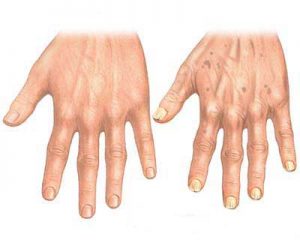People have an incessant fear of aging even though it is an inevitable part of life. Many people work hard to slow down the aging process whether it is through diet and exercise or expensive treatments and products. This fear has fed into the global anti-aging market which was worth a staggering $250 billion in 2016. In 2018, investors have supplied $850 million to anti-aging startups and research. Undoubtedly, anti-aging is a prevalent fear in society today.

Image shows an aging hand. Source: Wikimedia Commons
The Aging Process
People age as their body begins to accumulate senescent cells (damaged cells) and cells that are no longer able to divide, replicate or function. As dead cells accumulate in the bodies of younger people, they are able to release inflammatory factors that alert the immune system to clear the cells out. However, as people grow older their immune system is not as efficient and they aren’t able to clear out the damaged cells out effectively. Eventually, the accumulation of damaged cells leads to inflammation and release of tissue-degrading enzymes.
Here is a short video by asapSCIENCE that describes the science of aging.
Research on Aging Process
In a past article, University of Minnesota researchers Paul D. Robbins and Laura J. Niedernhofer and Mayo Clinic investigators James L. Kirkland and Tamara Tchkonia have discussed the possibility of decreasing the stress of senescent cells to extend lifespan and improve overall health.

This image shows a variety of fruits and vegetables in which Fisetin can be found. Source: Pixabay
Fruits and vegetables are important component of our everyday diet. They contain beneficial vitamins and are rich in nutrients which is why they have so many known health benefits. Thus, it is not a surprise that Fisetin, a natural product discovered to slow down the aging process is found in fruits and vegetables. Dr. Robbins and his team has identified that Fisetin can have positive effects on overall health and lifespan. They did this through their research with mice that were near end of life. The mice treated with Fisetin showed an improvement in health and life span. The researchers were able identify that the treatment was actually attacking senescent cells by using mass cytometry with the help of Edgar Arriaga, a professor in the Department of Chemistry at the University of Minnesota. Dr. Robbins mentions in the article that “In addition to showing that the drug works, this is the first demonstration that shows the effects of the drug on specific subsets of these damaged cells within a given tissue”.
These results reinforce the importance that fruits and vegetables have on our health and how incorporating them into our diet will result in many health benefits, one of which is anti-aging.
Reshmin Randhawa

5 responses to “Researchers Discover New Way to Slow Down Aging!”